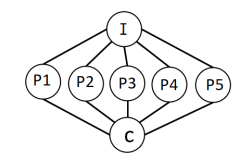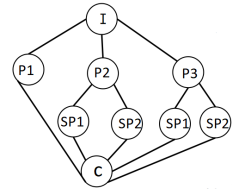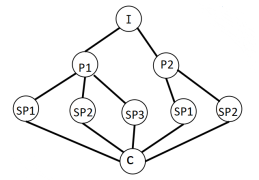We believe that educating the “whole student” opens the door to the “whole world”. Our rich and dynamic co-curricular program enables each student to experience an exceptional array of activities, carefully designed to provide just the right level of challenge, engagement and fun. Our exceptional co-curricular program is delivered by dedicated teachers and staff members or by experts from the wider community. As a result, each student is encouraged to pursue his or her passions and talents. Co-curriculars also provide a valuable opportunity for our students to develop flexibility and perseverance by challenging them to step outside their comfort zone and try something new:
Kindergarten: Beginnings
Our youngest students learn about themselves and their important place in our school community by engaging in activities that introduce them to the wonders of the natural world and that develop their motor skills.
Junior School (Grades 1~5): Discovery
Co-curriculars in junior school are designed to enable our students to discover new talents and interests while developing their existing skills. Student agency and confidence are nurtured through the program, with an emphasis on participation and fun as well as on skill development.
Middle School (Grades 6~8): Exploration
The Middle Years are the perfect time for students to explore a wide variety of co-curricular activities. At a stage when many young people experience a lack of self-confidence, co-curriculars in our middle school are designed to challenge, to engage and to celebrate the unique qualities that each student brings to the school community.
Senior School (Grades 9~12): Focus
In our senior school, students are encouraged to refine their interests and to specialize in certain areas. The co-curricular program at this level allows them to develop mastery and to focus on specific activities of choice.
1. Which of the following might be one of the purpose of co-curriculars?| A.To create a stress-free campus. |
| B.To ensure that students’ dreams come true. |
| C.To make students feel comfortable. |
| D.To build a complete personality for students. |
| A.Kindergarten. | B.Junior school. | C.Middle school. | D.Senior school. |
| A.doubt others | B.disbelieve themselves |
| C.abuse themselves | D.afraid to fit into the community |
相似题推荐
【推荐1】Learn to Swim
Knowing how to swim prevents drowning (溺水) and improves your health, fitness, and safety. To help teach New Yorkers to swim, the New York City Department of Parks & Recreation is offering swimming lessons to children (6 to 17 years old) at our indoor pools.
Cost
Free with an NYC Parks Recreation Center membership. All Learn to Swim participants (参加者), including children and their parents, must be members of the recreation center.
About the Classes
·Your child must be 6 years of age on the first day of class in order to participate in the program. Please make sure to bring a legal document (法律文件) with the date of birth listed for the child on the day of the first class. Documents will be returned after confirmation is completed.
·There are classes at two different times: on Saturdays, and after school from 4:00 p.m.to 5:00 p.m.
·All participants must take a water test on October 30 for the fall session (学期),January 1 for the winter session, and March 29 for the spring session to determine class level. Missing the water test will result in a first absence.
·If a child misses the water test and the first day of class, they will be dropped from the session. Participants who miss two continuous classes will be dropped from the program.
·Level Ⅰ: Children at this level learn basic skills, such as getting into and leaving the water, controlling their breath, moving through the water and what to do in case of an emergency (紧急情况).
·Level Ⅱ: Children at this level learn to swim without assistance. They’ll be able to understand dangerous water conditions and how to help a swimmer in a water emergency.
1. Who can take part in Learn to Swim lessons?| A.All of the teenagers. | B.Members of the recreation center. |
| C.Any student in the New York City. | D.Parents eager to learn swimming. |
| A.Promise not to miss classes. | B.Hand in their school reports. |
| C.Prove their age with formal papers. | D.Do a water test at home. |
| A.Ways to offer help when needed. | B.Competitive spirit. |
| C.The importance of teamwork. | D.The value of appreciation. |
【推荐2】Our online classes bring highly skilled teachers to prepare the students for colleges and future internationally competitive careers. The AoPS Online School is accepted by the Western Association of Schools and Colleges.
How Classes Work
Our classes offer a wide variety of learning ways and opportunities for students to communicate with each other and with our teachers. Since 2003, the AoPS Online School has provided a unique learning experience carefully designed for students studying online. We offer programming courses and special courses to prepare students for particular math and science competitions. Most of our courses meet weekly for live sessions(直播课), and have a variety of types of homework.
Skilled Teachers
Many of our teachers won major math awards and earned degrees from schools like MIT, Harvard, Stanford and Princeton. They understand what the students need from their personal experience, and they serve as role models for students who want similar success.
Live Instruction
The weekly class sessions are live discussions. Our online classroom allows students to ask questions at any time. Instructors decide which of these questions to share with everyone and which to address. privately.
This flexibility(灵活性) allows teachers to guide public discussion while addressing each student's misunderstanding.
Active Learning
Students best learn how to solve a difficult problem by doing it themselves, not by watching passively(被动地) as others do it. In our classroom, students solve each problem, with instructors asking questions as guidance, This class really builds the foundations necessary for students’ future success.
1. What's one character of the AoPS Online School?| A.The learning ways are simple. |
| B.Students seldom have homework. |
| C.Many courses have weekly live classes. |
| D.Students can easily pass math and science tests. |
| A.Deal with them in different ways. |
| B.Encourage other students to answer them. |
| C.Explain them to students privately all the time. |
| D.Ask every student in class for a solution immediately. |
| A.Discussing problems with other students. | B.Looking at the ways other students use. |
| C.Turning to the teachers for help. | D.Solving problems on their own. |
【推荐3】Last fall, I happened to overhear a student telling the others he had decided not to sign up for an introductory philosophy course. The demands of his major, he said seriously, meant he needed to take “practical” courses, and “enlightenment” would simply have to wait. For now, employability was the most important.
The students’ conversation fits into a larger alarming narrative about the role of the humanities in higher education. In a time of dizzying technological achievement and of rapid scientific innovation, sceptics of the humanities may question the usefulness of studying Aristotle, the Italian Renaissance or Chinese fiction.
Actually, I regret not interrupting that student to argue for taking that introductory philosophy course. I would have started by reminding him that, for much of America’s history, college graduates were not considered truly educated unless they had mastered philosophy, literature, political theory and history. The key role of higher education was to invite students into the conversations about matters like what it means to be alive and the definition of justice. Fostering engagement with these subjects is still an essential part of the university’s function in society.
I would have also mentioned to the student that he was misinformed about the job market. It is true that many employers are looking for graduates with specialized technical skills, but they also look for other capabilities. As the world is transformed by artificial intelligence, machine learning and automation, the unique human qualities of creativity, imagination and moral reasoning will be the ultimate coin of the realm. All these skills are developed in humanities courses.
Further, I would have argued that while a degree anchored in the sciences is an important precondition for many jobs, it is not the only route. Look no further than the founders of companies such as LinkedIn, Slack and Flickr, who are among the many tech businesspersons with degrees in the humanities, and who credit that training for their success.
Contrary to the widely held belief that humanities majors have a hard time getting jobs, recent studies show that those with humanities degrees are successful in the workplace, experiencing low rates of unemployment and reporting high levels of job satisfaction. The ratio between average median(中位数) incomes for humanities degree holders and those with business, engineering, and health and medical sciences degrees has been shown to narrow over the course of a career.
The case for the humanities can also be understood in less transactional terms and more as a foundational preparation for a life well lived. A humanities education plays a vital role in encouraging citizens to lead an examined life. It fosters critical thinking, self-reflection, empathy and tolerance, the usefulness of which only becomes more apparent as one navigates life’s challenges.
By all means, students should take courses they think practical and follow their interests, but if they also make a point of studying the literature of the Renaissance, or researching into modern poetry, or even taking introductory philosophy, we will all benefit.
1. What do the students’ conversation show?| A.Students feel employment difficult. |
| B.Students think philosophy less important. |
| C.Students find scientific innovation amazing. |
| D.Students consider university courses unsatisfying. |
| A.Highly valued. | B.Equally applied. |
| C.Strictly assessed. | D.Greatly improved. |
| A.discover students’ artistic ability |
| B.prepare students for graduation |
| C.raise awareness of social status |
| D.provide great insights into life |
I: Introduction P: Point Sp: Sub-point(次要点) C: Conclusion
A. | B. |
C. | D. |
Disney Premier Access More Flexible Access to the Fun  With Disney Premier Access, enjoy priority access to some of your favorite attractions anytime of the day! Get to the fun faster and enjoy even more magic in the Park. Now available on the Shanghai Disney Resort App |
Disney Premier Access is available for the following attractions: Soaring over the Horizon in Adventure Isle Roaring Rapids in Adventure Isle TRON Lightcycle Power Run in Tomorrowland Peter Pan’s Flight in Fantasyland The Many Adventures of Winnie the Pooh in Fantasyland Pirates of the Caribbean—Battle for the Sunken Treasure in Treasure Cove |
How It Works: Step 1: Download Shanghai Disney Resort App before you come to the Park and create your own account with your mobile phone number and email account. Step 2: After entering the Park, open the Shanghai Disney Resort App and sign in, select “Buy Disney Premier Access” and choose the attraction that you want to purchase Disney Premier Access for, or purchase a Disney Premier Access Set. Step 3: Link your park ticket to your account by scanning the QR code on your park ticket. Step 4: Create a party in the app by linking your friends’ or family’s tickets so that you can enjoy the attractions together. Ensure all members of your party have entered the park. Step 5: Confirm the selection for your Disney Premier Access or set and complete the payment process. Step 6: To use your Disney Premier Access, whenever you wish, go to the Fast-pass return entrance at the attraction and show your QR code in “My Plan” on the app or the QR code on your park ticket. If you have any questions or difficulty purchasing Disney Premier Access, please visit Guest Service after the turnstiles (十字转门) at the main entrance. Disney Premier Access is subject to availability. |
| A.save the cost of access to some available attractions |
| B.enter Shanghai Disneyland Park faster with priority |
| C.shorten the waiting time for entering some attractions |
| D.open their own accounts on Shanghai Disney Resort App |
| A.show your Fast-pass |
| B.download “My Plan” |
| C.return your park ticket |
| D.present your QR code |
| A.The number of people who can get Disney Premier Access is limited. |
| B.Disney Premier Access can be bought at Guest Services at the main entrance. |
| C.A party needs to be held if you want to visit the park with your friends or family. |
| D.Your friends’ or family’s tickets can be linked to your account beforehand at home. |
I am seeking a babysitter for my 6-month-old son. A few hours on Saturdays and Sundays to help me and then other times as needed. He or she should be over 18, responsible, loving, warm, and have some experience in caring for babies. This position also suits a college student with experience looking for a part-time job. The pay is $10 an hour.
If this sounds like a good job to you, please reply to rebecharv@aol.com or call 800-4964.
Office Manager Wanted
Our company is looking for a full-time experienced manager to run the business. Strong skills in organization and business management are required for this position. The office manager will be responsible for keeping financial (财务的) records, so he or she should be familiar with computers.
Please reply to jim@californiaaquatics.com or call 800-6978 to apply.
Waiter/ Waitress Wanted
A restaurant is looking for an experienced waiter / waitress. Knowledge of wines and experience in dining are necessary. Must work well under pressure and understand the basics (基本要素) of fine dining and customer service.
If you’re interested, please contact us at job-tkupe-1329358152@craigslist.org to apply.
This is a part-time job.
Office Cleaner Wanted
Looking for a Part-time job? A position in the Mississauga area needs an office cleaner! Part-time 4 hours a day from 10:00 am - 2:00 pm.
Duties include:
●Cleaning the washrooms
●Cleaning the furniture
●Sweeping the floors
●Other general cleaning experience is necessary. Pay: $15 per hour
Reply to:job-p3b7u-1365632206@craigslist.org or call 800-8197.
1. Which of the following position is a full-time job?
| A.Office manager. | B.Babysitter. |
| C.Waiter / waitress. | D.Office cleaner. |
| A.job-p3b7u-1365632206@craigslist.org |
| B.job-tkupe-1329358152@craigslist.org |
| C.rebecharv@aol.com |
| D.jim@californiaaquatics.com |
| A.The office cleaner has to work three hours each day. |
| B.Experience is necessary for all these four jobs. |
| C.A babysitter earns $5 more than an office cleaner per hour. |
| D.One can apply for a waiter or waitress by telephone. |
| A.Having knowledge of wines. |
| B.Being familiar with computers. |
| C.Knowing more about menus. |
| D.Working well with others. |
【推荐3】In Роtоmac Sсhоol, clubs are students-designed and led by a teacher, who guides student participants.
POLTICAL DISCUSSIONS CLUB
Whether you are interested in politics and have very strong opinions, or if you just want to listen to other people’s opinions, this club is for you. If you see something in the news you think would be a good, debatable topic, you can bring it in to our meeting every other week to have it debated. Even if you don’t know anything about politics, come in and learn something because politics play a huge role throughout our lives
INVESTMENT CLUB
Our mission is to educate students about the market economy and the potential risks and rewards involved with business. We plan to hold weekly and monthly competitions, in order to see who is most successful
DANCERS OF POTOMAC
The Dancers of Potomac meet to learn about and practice styles of contemporary dance with an eye toward raising awareness about the beauty and power of dance within the Potomac community.
BELLS CLUB
Bells Club is a group designed to designed to music we listen to between classes. It’s a great way to set the energy and introduce the beauty of music to the Potomac community.
INSONGNIACS
Insongniacs is a cappella singsing club, founded in the fall of 2012. The group performs a range of music from pop hit to traditional folk ballads.
1. If you want to learn more about the potential risks of a war, which club should you join?| A.POLTICAL DISCUSSIONS CLUB | B.INVESTMENT CLUB |
| C.DANCERS OF POTOMAC | D.BELLS CLUB |
| A.Students with background knowledge play a huge role in Political Discussions Clubs. |
| B.Students will be able to start a real business by joining the Investment Club. |
| C.Dancers of Potomac and Bells Club tend to help students to appreciate the beauty of arts. |
| D.Students good at dancing can have a chance to play an important role in Insongniacs. |



